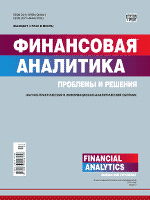Abstracting and IndexingРИНЦReferativny Zhurnal VINITI RAS Worldcat Google Scholar Online availableEastvieweLIBRARY.RU Biblioclub |
A result-based approach in the public sector in the context of non-financial (extra-budgetary) risk
Available online: 3 November 2014 Subject Heading: BUDGETARY REFORM JEL Classification: Pages: 51-61
In modern conditions, the result-oriented budgeting, or result-based approach, is a key vector of the budgetary process. The implementation of this approach depends on a set of non-financial (non-budgetary) risks. The article considers the basic risks, and also describes their impact on the possibility of the successful implementation of the result-based approach. The author also makes recommendations on improvement of budgeting sector actors. In the majority of the world's countries, the result-based approach is being actively developed in the budgeting sector. The special direction of reforming the budgeting process in the context of result-based approach was named as "result-oriented budgeting". There are a great number of opinions, points of view on almost any part of the result-based approach, or result-oriented budgeting. In particular, there is no consensus about what should be considered as the result. The most common is the view that at the stages of planning and execution of budgets, the results of two kinds should be established and enforced: direct and final results. As the direct result, the author considers the volume and quality of the services provided by the State, and as the final result the author considers the effect for consumer services caused by provision of the given services. Specifically, the definition of direct and final results of activity of ministries and departments is the starting point of a new method of budgeting, i.e., result-oriented budgeting. Recognizing the result-based approach as a key component of the activities of all actors in the budgetary sphere, the author draws attention to the disclosure of objective constraints (impacts) that may adversely affect the ability to successfully implement this approach. Prediction of the negative impact of various restrictions, the development of preventive measures to avoid the worst case scenario, the implementation of operational activities in the context of limitations (impacts) are the activities of budgeting sector entities that will contribute to the most appropriate definition of planned results and their most complete achievement. Keywords: result-based approach, budget, budgetary planning, non-financial, non-budgetary, risk References:
|
ISSN 2311-8768 (Online)
|
|








